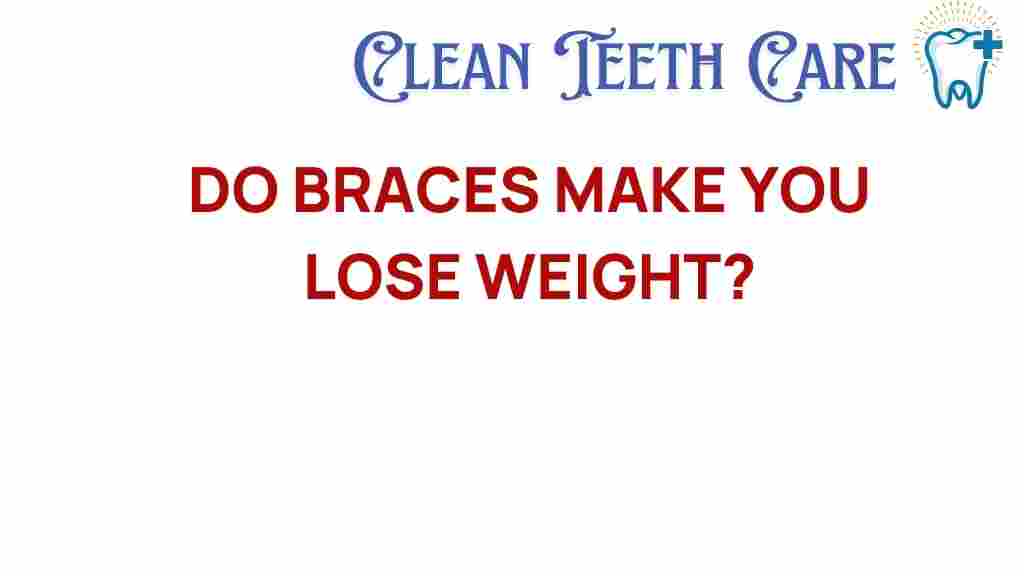Do Braces Really Cause Weight Loss? The Surprising Truth Revealed
When people think about getting braces, their primary concern often revolves around the aesthetic and health benefits of orthodontic treatment. However, an intriguing question arises: do braces really cause weight loss? This article delves into the surprising truth behind braces, weight loss, and how they relate to your dental health, eating habits, and lifestyle changes.
The Connection Between Braces and Weight Loss
Braces are primarily designed to align teeth and correct bite issues, but they can inadvertently affect your eating habits and nutrition. Here’s how braces might contribute to weight loss:
1. Initial Discomfort and Dietary Adjustments
When you first get braces, it’s common to experience discomfort in your mouth. This discomfort can lead to changes in your diet:
– **Soft Foods:** For the initial few days or weeks, many patients opt for softer foods to avoid aggravating their mouths. This can include:
- Yogurt
- Smoothies
- Mashed potatoes
- Soup
– **Reduced Appetite:** Due to soreness, some people may not feel hungry and may skip meals, resulting in a decrease in caloric intake.
2. Changes in Eating Habits
Once you have braces, you might find yourself more conscious about your eating habits. Certain foods are off-limits or should be eaten with caution, including:
– Chewy candies- Hard vegetables- Nuts- Popcorn
As a result, you may start choosing healthier options that are easier to eat, leading to a more balanced diet.
3. Increased Awareness of Dental Health
Having braces often increases one’s awareness of dental care. People tend to focus more on maintaining their oral hygiene, which can influence their overall diet. Healthy eating can lead to improved nutritional intake, which may cause weight changes.
Braces, Weight Loss, and Nutrition
Nutrition plays a vital role in how braces can impact weight. Here are some key points to consider:
1. Nutrient-Dense Food Choices
Since braces make it challenging to eat certain foods, many individuals pivot towards more nutritious options. Incorporating:
– Fruits (bananas, applesauce)- Vegetables (steamed or pureed)- Lean proteins (chicken, fish)
These choices not only support dental health but also promote a healthier lifestyle.
2. Maintaining a Balanced Diet
While it might be tempting to stick to soft foods, it’s crucial to maintain a balanced diet. Here’s how to ensure you’re getting the nutrients you need:
– **Variety:** Include a range of food groups in your diet.- **Supplements:** If necessary, consider vitamins or minerals to fill nutritional gaps.- **Hydration:** Drink plenty of water to stay hydrated and support overall health.
Step-by-Step Process: Adapting Your Diet with Braces
If you’re concerned about weight loss while wearing braces, follow these steps to adapt your diet:
Step 1: Plan Your Meals
Planning meals ahead of time can help you make healthier choices. Consider incorporating:
– Smoothies for breakfast- Soft grain bowls for lunch- Steamed vegetables and protein for dinner
Step 2: Focus on Oral Care
Proper oral care is essential while wearing braces. This includes:
– Brushing after every meal- Flossing daily- Using mouthwash to rinse away food particles
Step 3: Monitor Your Weight
Keep track of your weight during your orthodontic treatment. If you notice significant changes, consult your orthodontist or a nutritionist for advice.
Step 4: Seek Professional Guidance
Consider speaking with a registered dietitian or nutritionist. They can provide personalized meal plans that cater to your braces while ensuring you maintain a balanced diet.
Troubleshooting Tips for Weight Loss Concerns
If you’re experiencing unexpected weight loss due to your braces, here are some troubleshooting tips:
1. Adjust Soft Food Options
If you’re finding it difficult to eat, try to diversify your soft food options. Here are some ideas:
– **Smoothies:** Add protein powder or nut butter for a nutrient boost.- **Soups:** Incorporate more proteins and vegetables to make them heartier.- **Pasta:** Cook until very soft and add sauces to enhance flavor.
2. Increase Meal Frequency
If you’re experiencing a reduced appetite, consider having smaller, more frequent meals rather than three large ones. This can help increase overall caloric intake.
3. Hydration is Key
Sometimes, people mistake thirst for hunger. Ensure you’re drinking enough water throughout the day to stay hydrated.
4. Consult Your Orthodontist
If you’re consistently losing weight, it’s essential to discuss your concerns with your orthodontist. They can provide guidance and possibly recommend a referral to a nutritionist.
Conclusion: The Impact of Braces on Weight Loss
In conclusion, while braces are primarily intended for orthodontic correction, they can indeed influence weight loss through changes in diet and eating habits. The discomfort associated with new braces often leads to temporary dietary adjustments, but with proper planning and attention to nutrition, you can maintain a healthy lifestyle. Focus on a balanced diet, prioritize oral care, and consult professionals when necessary to navigate your journey with braces effectively.
For more information on maintaining your dental health while undergoing orthodontic treatment, check out this helpful resource. If you have further questions about braces, weight loss, or nutrition, feel free to reach out to a dental professional.
This article is in the category Treatments and created by CleanTeethCare Team
